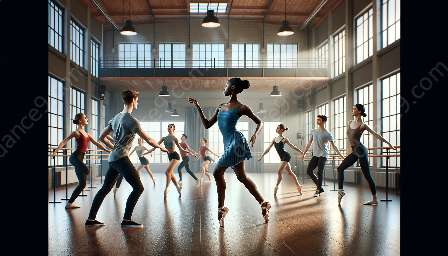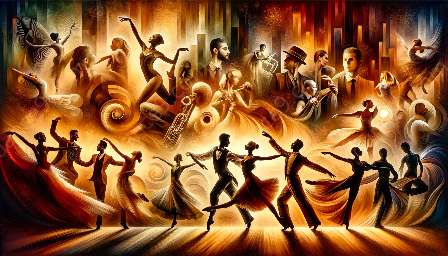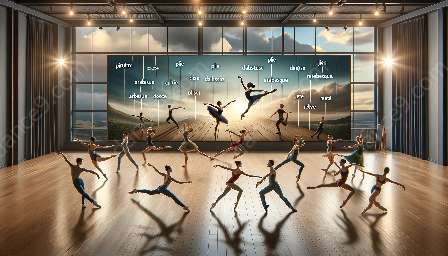Competing in dance competitions can put significant pressure on dancers, often leading to feelings of stress and anxiety. To successfully navigate these challenges, it's essential to develop effective mental strategies that can help manage competition pressure and optimize performance.
Utilizing a combination of psychological techniques and practical approaches, dancers can build resilience, maintain focus, and enhance their overall competition experience. In this comprehensive guide, we will explore a range of mental strategies tailored specifically to dance competitions, offering valuable insights and actionable advice to support dancers in coping with competition pressure.
Understanding Competition Pressure
Competition pressure is a common phenomenon experienced by dancers participating in dance competitions. It encompasses the stress, nerves, and anxiety that arise from the desire to perform well and achieve success in a competitive setting. Recognizing the impact of competition pressure is the first step towards adopting effective coping strategies.
Recognizing Signs of Pressure
It's important for dancers to be able to identify the various signs and symptoms of competition pressure, such as racing thoughts, increased heart rate, tension in the body, and self-doubt. By recognizing these indicators, dancers can take proactive steps to address their mental state and implement appropriate coping mechanisms.
Building Resilience
Resilience is a key component of managing competition pressure. Fostering mental resilience involves developing the ability to bounce back from setbacks, adapt to challenges, and maintain a positive outlook. Dancers can cultivate resilience through practices such as mindfulness, positive self-talk, and visualization techniques.
Mindfulness Techniques
Practicing mindfulness can help dancers stay grounded and present, reducing the impact of external pressures. By focusing on the present moment and engaging in techniques such as deep breathing and body scans, dancers can manage their stress levels and enhance their performance readiness.
Positive Self-Talk
The way dancers talk to themselves internally can significantly influence their ability to cope with competition pressure. Encouraging positive self-talk, affirmations, and constructive dialogue can bolster confidence and combat negative thoughts, promoting a resilient mindset.
Visualization
Utilizing visualization techniques allows dancers to mentally rehearse their performances, envisioning success and overcoming obstacles in their minds. This mental rehearsal can instill a sense of familiarity and confidence, effectively reducing the impact of competition pressure.
Managing Stress
Effective stress management is crucial for dancers facing competition pressure. By implementing stress-reducing strategies and self-care practices, dancers can minimize the negative effects of stress, allowing them to perform at their best.
Relaxation Techniques
Engaging in relaxation techniques, such as progressive muscle relaxation, deep breathing exercises, and meditation, can help dancers alleviate stress and promote a state of calmness and focus before and during competitions.
Time Management
Developing strong time management skills can contribute to stress reduction. By organizing schedules, setting realistic goals, and prioritizing tasks effectively, dancers can minimize last-minute pressure and maintain a sense of control.
Enhancing Focus
Staying focused amidst competition pressure is essential for optimal performance. Dancers can employ various techniques to enhance their focus and concentration, enabling them to perform with clarity and precision.
Goal Setting
Setting clear, attainable goals can help dancers direct their focus and motivation, providing a sense of purpose and direction amid competition pressure. Establishing both short-term and long-term goals can contribute to enhanced performance.
Concentration Exercises
Engaging in concentration exercises, such as mental imagery, attention control drills, and rhythm perception activities, can sharpen a dancer's ability to maintain focus amidst distractions and pressure.
Applying Mental Strategies in Practice
Integrating mental strategies into regular dance practice is crucial for their effectiveness in competition settings. By incorporating these strategies into daily training routines, dancers can solidify their mental resilience and preparedness for competitions.
Simulation Training
Simulating competition scenarios during practice sessions can help dancers acclimate to the pressure and environment they will face during actual competitions. Creating high-stakes practice situations can desensitize dancers to pressure and build confidence.
Performance Routines
Developing personalized performance routines, encompassing mental warm-ups, visualization sessions, and relaxation practices, can anchor dancers in a familiar, comforting pre-performance ritual, reducing the impact of competition pressure.
Seeking Support
It's important for dancers to recognize the value of seeking support and guidance when coping with competition pressure. Whether from coaches, peers, or professionals, supportive networks can provide valuable assistance in navigating competition-related challenges.
Effective Communication
Open dialogue with coaches and peers can foster an environment of understanding and collaboration. By addressing concerns and sharing experiences, dancers can gain insights and encouragement that aid in coping with competition pressure.
Professional Guidance
Seeking the expertise of mental performance coaches or sports psychologists can offer tailored support for managing competition pressure. These professionals can provide personalized strategies and interventions to address individual mental challenges.
Conclusion
Effectively coping with competition pressure in dance competitions requires a multifaceted approach that encompasses mental resilience, stress management, focus enhancement, and support seeking. By proactively implementing these mental strategies, dancers can cultivate a stronger psychological foundation, enabling them to thrive in competitive dance environments and derive fulfillment from their performances.











































